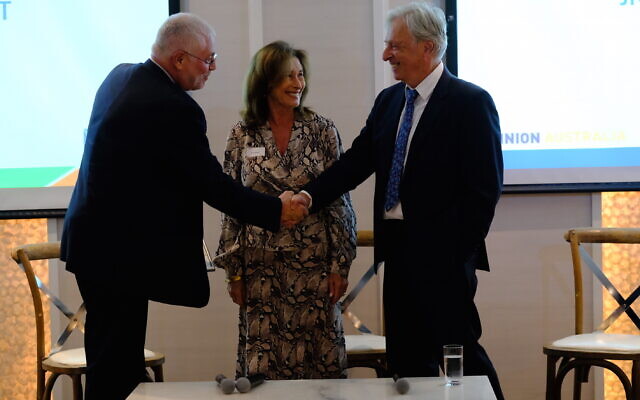‘Very close partnership, friendship’
AJN publisher Robert Magid and his wife Ruth will receive honorary doctorates from Technion – Israel Institute of Technology later this year.
ROBERT and Ruth Magid will become the first Australian Jewish philanthropists to receive honorary doctorates from Technion – Israel Institute of Technology at the university’s annual board of governors in June.
The honour, which recognises their $US3million support of the university’s undergraduate quantum science and technology programs, was announced by recently appointed Technion president Professor Uri Sivan at the joint Technion-JNF “Future of Innovation and Entrepreneurship” event in Sydney.
Sivan, who also gave a presentation at PricewaterhouseCoopers in Melbourne, told The AJN the doctorates were in recognition of the “very close partnership and friendship” with the Magids.
“Quantum science and technology is a very complex subject … they were ready to take the time and understand those issues,” he said.
“They’re not just donors – they became our partners. We are marching together through this revolution and we are truly grateful.”
Robert Magid, who is the publisher of The AJN, said supporting the new programs “sounded the most exciting proposition”.
“We have to keep Israel one step ahead and this was one of the ways to do it,” he said. “The Technion is the cradle of Israel’s engineering and scientific capability.”
Sivan, who visited Australia to promote and strengthen collaborations locally, explained that quantum technologies are going to be “extremely important” adding, “They’re going to be disruptive to many current technologies.”
More generally, he said Technion today faces three main challenges.
“The grand challenges of the 21st century are multidisciplinary by nature,” he said, despite universities being structured according to discipline. For example, human health transcends medicine, life sciences, physics, engineering and more. To meet this challenge, Technion will set up “megacentres” – in human health, energy and sustainability, and advanced manufacturing initially, while maintaining its existing departments.
He said the second challenge is that “universities have lost [their] monopoly over information”.
“You have online courses, you have Wikipedia, you have zillions of videos,” he explained. “Since information by itself is now available to all, our role is shifting more towards integration of different disciplines and teaching the students to ask good questions, how to innovate and how to take considerations beyond pure science, such as environment into account,” he said.
“The third issue … there used to be a clear distinction between pure research done at a university and applied research done in industry.”
With this no longer the case and companies like Google, IBM and Microsoft having research budgets “equivalent of that of superpowers” and motives different to those of society, he said a solution was needed to ensure the best interests of society were always protected above profit.


comments